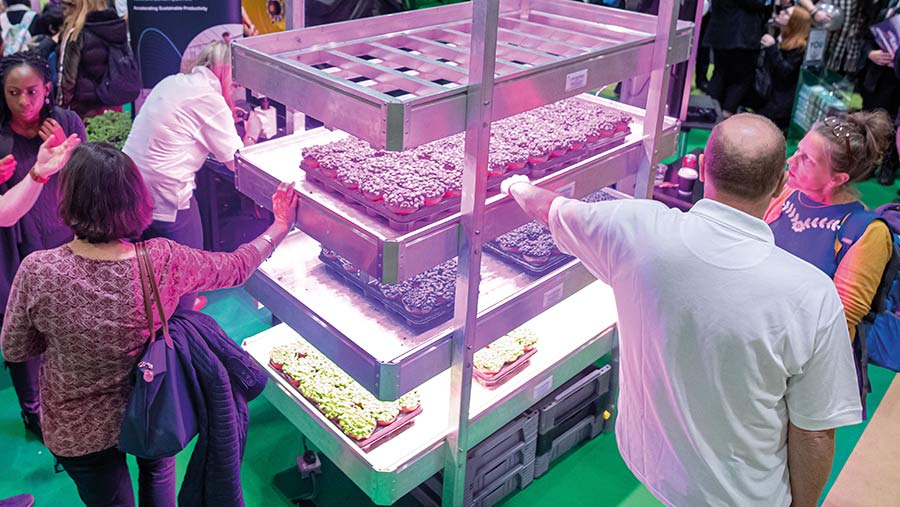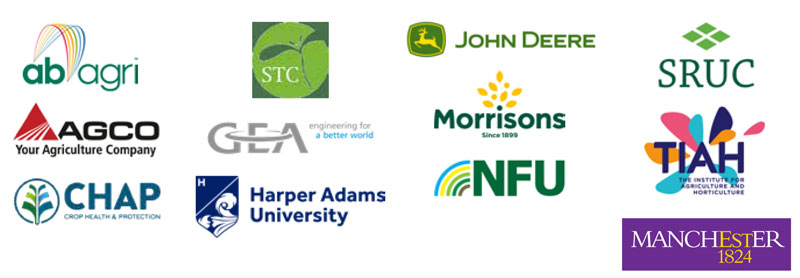Agriculture on exhibition at New Scientist Live – win tickets
 © Telling Photography
© Telling Photography Farmers Weekly is working with a group of leading farming businesses and organisations to bring the Future of Food & Agriculture to the New Scientist Live event in Manchester from 12-14 March.
Our aim is to change the misconception that farming is low-tech, low-skill and slow-moving, giving visitors hands-on experience of some of the exciting developments helping to shape the future of farming.
“British farming has a fantastic story to tell when it comes to inspiring young people,” says NFU president Minette Batters.
See also: FW Learning Centre: Grow your farming knowledge and career
“Whether that is the wide variety of high-tech, fast-paced careers across the sector, or working directly with teachers in schools alongside the science, technology, engineering and maths curriculum to bring learning to life.”
A range of interactive exhibits will underpin that learning. Visitors can get stuck in with activities including robotic milking, dairy product making and tasting sessions, laser weeding technology, a microscopic view of the organisms in our soils and a bee observation unit.
AB Agri will be showcasing the role of nutrition in dairy herds. Katie Bramwell, head of communications, explained: “We’ll be exploring the science and technology that goes into producing food, and visitors can learn about the role animal nutrition plays in building a responsible food chain by feeding our digital cow.”
Win tickets to New Scientist Live Manchester
We have 50 all-access two-day passes to New Scientist Live for 12-13 March up for grabs. Claim yours by going to the ticket website and using the promo code NSLFARMERS.
New Scientist Live is the world’s biggest science and technology fair. Running from 12-14 March in Manchester, the hybrid event combines static and interactive exhibits with inspirational talks.
Over the course of three days, some 9,000 people will attend in person, and a virtual audience of more than 3,000 is also expected to log in to take part.
The festival of science, usually held in London, is heading north for the first time to welcome people of all ages who are interested in science and technology, with the third day dedicated to schoolchildren.
Morrisons’ head of agriculture, Sophie Throup, is keen to win young hearts and minds: “We hope to inform and inspire the next generation of talent for our industry.”
Suzy Taylor, marketing and student recruitment officer at SRUC, added: “Education plays a key role in raising awareness of the challenges we face to ensure a more sustainable future.”
Most visitors will be from outside the traditional recruiting grounds of farming families and agricultural colleges, who could bring fresh skills into agriculture. And there will be plenty of food for thought for career-minded individuals.
The Institute for Agriculture and Horticulture will be asking visitors about their understanding and perceptions of careers in farming.
The Future of Food & Agriculture exhibition space will also feature a state-of-the-art tractor from Agco, highlighting the impressive, complex kit needed on modern farms – which bring with them the need for an advanced technical skill set.
What’s on show?
Visitors to the Future of Food & Agriculture zone will be able to take part in a range of activities, including:
Feed Daisy AB Agri’s exhibit will explain why Daisy the cow’s trough needs to contain the right mix of grains proteins, vitamins and minerals, and how they work to create a sustainable source of protein.
Vertical farming UK Agri-Tech Centre Chap will be showcasing a vertical farming unit with three levels for plants, each of which can be set to different light wavelengths (blue, red, white). Visitors can find out how the different colours affect plant health and learn why vertical farms can produce 10 times the crops typically harvested each year in the field.
Beneficial bugs Visitors can get up close and personal with killer wasps and mummifying aphids and a live hive of bees on the Harper Adams University stand. There will also be a laser-weeding robot demo and one of the largest drones in the UK.
Dairy’s journey Morrisons will be illustrating the time and effort that goes into successfully getting cheese from our farms to our stores, and show just how many different things can be done with milk, with interactive taste-test sessions throughout the day.
Soil safari Through an interactive table-top display from the University of Manchester, visitors can explore the microscopic world of soil flora and fauna – from mites and millipedes to fungi and bacteria – and learn about how and why these organisms are critical to maintaining a healthy soil ecosystem.
Mooving with the cows Fitbits for dairy cows, a butter-making workshop and a talk about healthy soil and the importance of cereal crops and legumes in animal feed production are among the activities being offered by SRUC.
High-tech milking A look at how robotics, sensors and 5G connectivity play a role in milk production, featuring a GEA robotic milker and a model cow fitted with internal sensors.
Agco aftersales training manager Richard Charles admitted it can be hard to find the right people because of mistaken beliefs about the industry.
“We are sometimes viewed as a closed shop – if you’re not already in ag then you can’t get into it. This is not the case,” he said.
Over the three days of New Scientist Live, Farmers Weekly and our partner organisations hope to meet thousands of visitors, and persuade as many of them as possible that agriculture is one of the most exciting places to be for an ambitious, tech-savvy young person.
“It is now more vital than ever to engage and attract new talent to the food and agriculture sectors, to provide the skills needed to innovate, sustain and deliver for the future, and to feed the nation,” said Saffron Grover, director of marketing, communications and recruitment at Harper Adams University.
The Future of Food & Agriculture team
Farmers Weekly is working with these organisations to bring the Future of Food & Agriculture exhibit to New Scientist Live Manchester.

